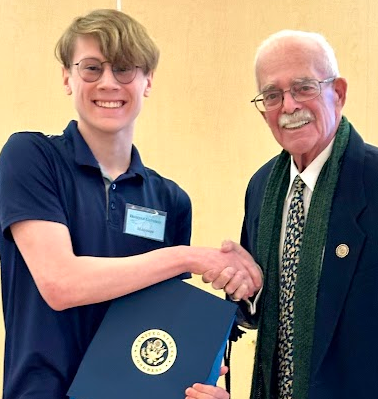A thick fog of academic fatigue hangs over the Madison hallways as the school year creeps closer to AP exams in May, marking another year of students losing their identity to a letter grade. Students’ vision narrows with every good grade they receive. They desire only one thing: the gratification that comes with receiving an “A.” If that gets stripped away, who are they?
Academic culture in Northern Virginia is known for its competitive nature. Many students find themselves drowning with five or six Advanced Placement classes, despite counselors discouraging them from taking on such a challenging course load.
“I always talk to students about their overall schedule: what activities are they involved in?” Madison counselor Alice Whitener said. “Students should never take courses simply because they think they ‘look good’ for college. Students should take courses that genuinely match their interests and potential career choices.”
Part of why students are discouraged from taking a plethora of difficult courses is because of the impact they can have on a student’s mental health. The increase in anxiety and depression within teens is undoubtedly a nod to the toll such classes take.
“Students aren’t getting enough sleep and ignoring other important healthy habits, like having time to do things socially and just ‘down time’ to get mental rest,” Whitener said. “I’ve been working in FCPS for almost 20 years and I have noticed far more students reporting symptoms of anxiety and depression than ever. It’s good that students are talking about how they are feeling, but it’s still concerning because I think taking on slightly less of an academic load could make a huge difference in a student’s quality of life.”
To escalate the issue, the rhetoric surrounding students’ grade point average and course load has only intensified as college acceptance rates have declined. According to Crimson Education, the acceptance rate for the University of Virginia’s class of 2024 was reported to be roughly 23%. In contrast, only 16.3% of applicants were admitted into the University of Virginia for the class of 2027, meaning the school experienced about a 7% decrease in admission. Many students have taken this in stride, enrolling in difficult courses and working tirelessly to attain the grades that will reward them with the highest possible GPA. With such demanding courses comes a greater, seemingly insurmountable work load.
“With all the pressure of AP classes, I’m swamped with work,” Sarah Biddick (’25) said. “It doesn’t give me time to do the things I love, and takes away time I could be spending with friends and family.”
Spending so much time dedicated to school tends to result in students associating their self worth with their grades. With each “A,” students feel a sense of relief so severe it’s akin to joy, making it hard to decipher between happiness and the feeling of hard work paying off. All their efforts become in search of this brief satisfaction, feeding into the distorted belief that their identity is derived from academic success. Students become reliant on the high that comes from being told by the school, colleges, even parents and peers, that their “A’s” make them worth something.
“When I have good grades I get a sense of fulfillment and accomplishment, I feel like I can go far.” Biddick said.
Craving academic validation leads to life becoming nothing but school, and school alone is not enough to sustain a healthy personal life. Many are sacrificing their social lives, family time, and enjoyable activities to increase their grades and partake in resume building extracurricular activities. Student’s burdens are only becoming weightier as the year progresses, leaving the unanswered question: Is there any way for the students to take their life back from the relentless grasp of academics?





